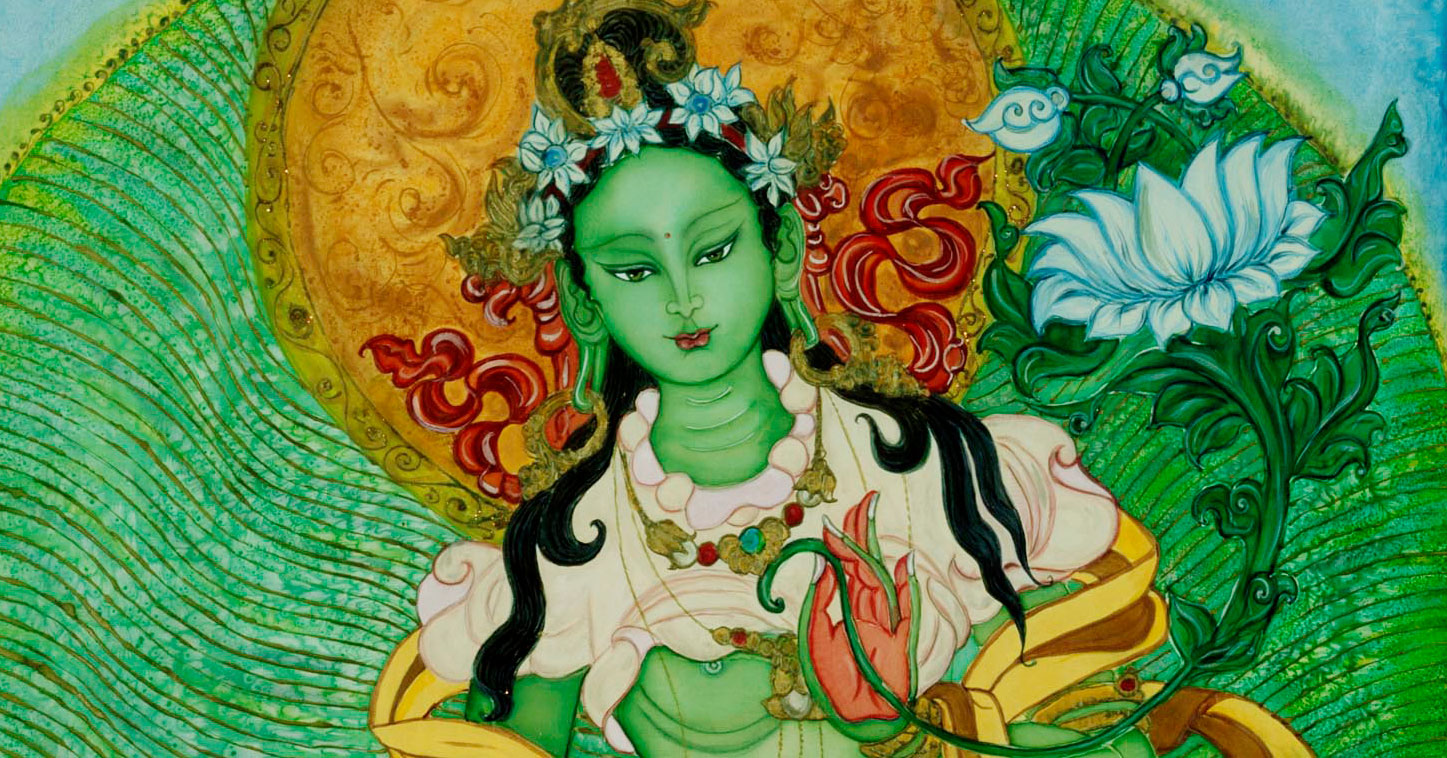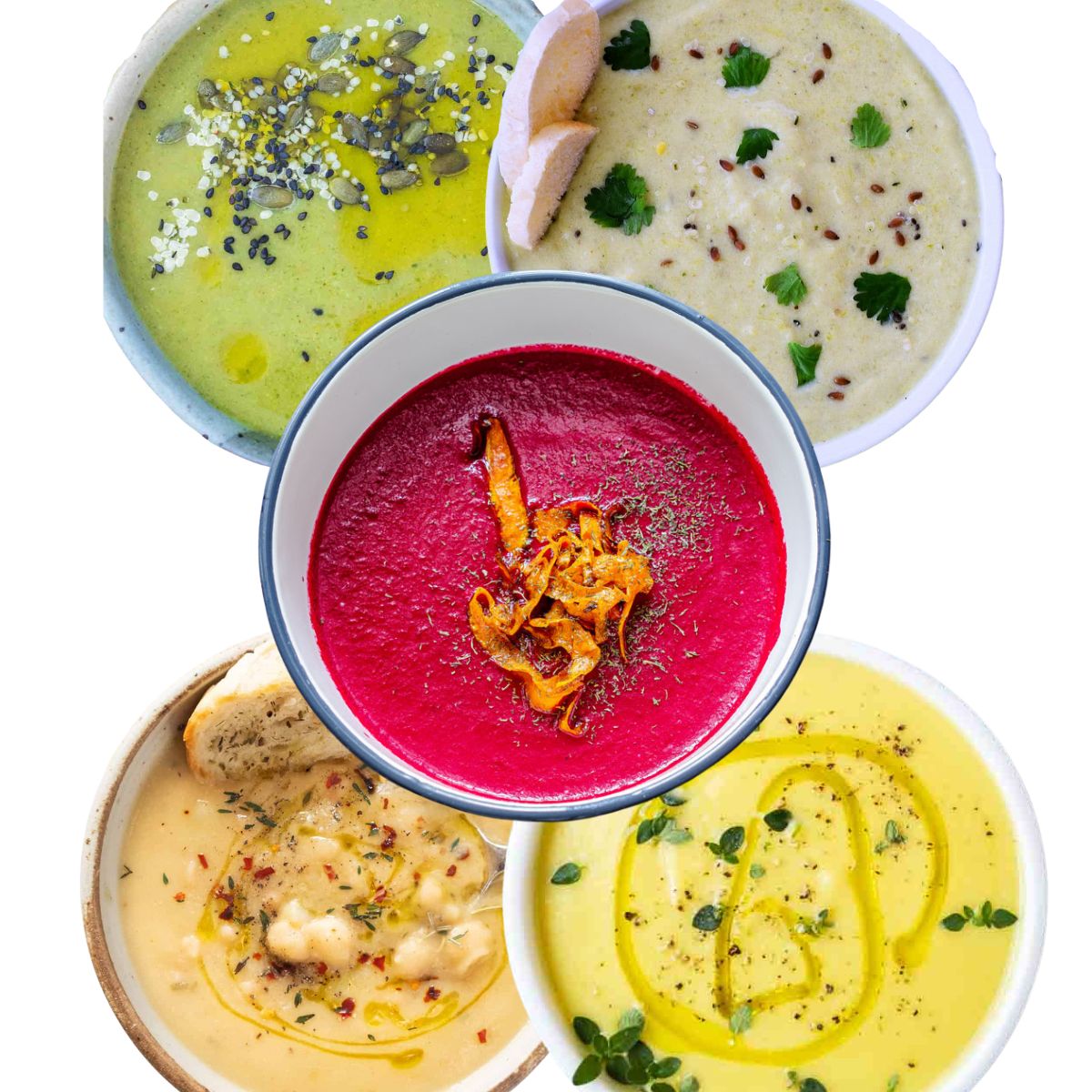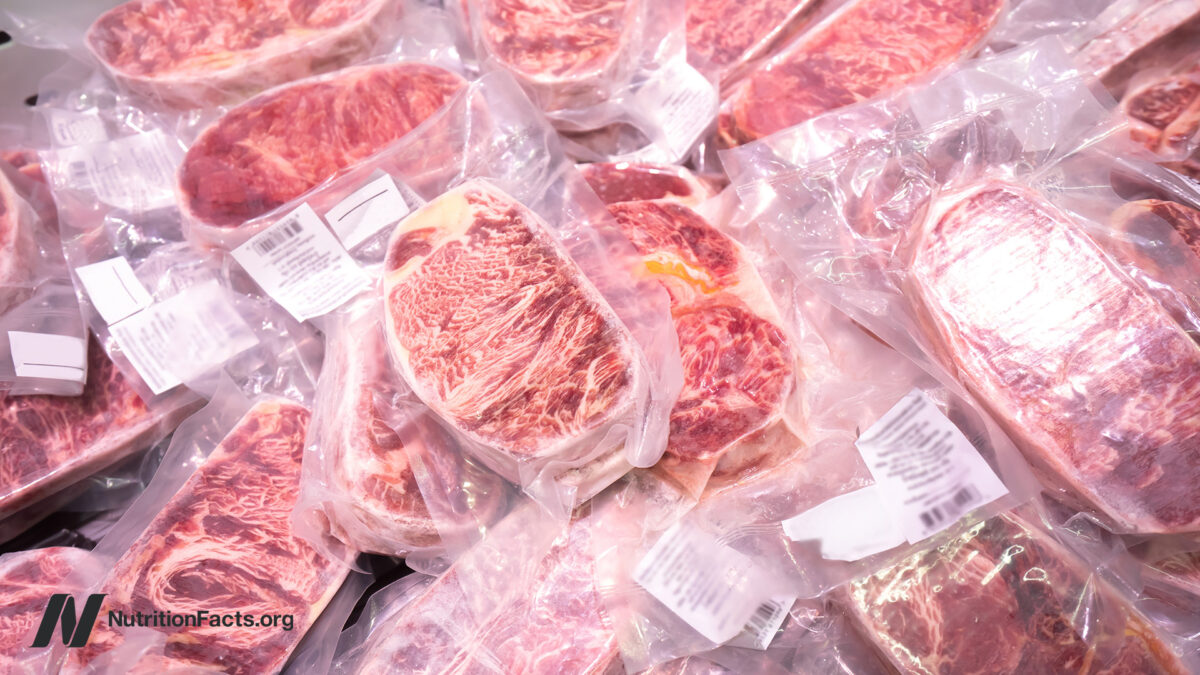Offerings “obtained righteously, and offered “with a pleasant mind” — Dakkhinaavibhangasuttam Sutta of Offerings
“A vast shower of merit will pour down on a giver.” –Samyutta Nikaya I.101 Offerings to those in need, and especially offerings to the Buddha, Dharma and Sangha always have skies of merit. If it is within our...
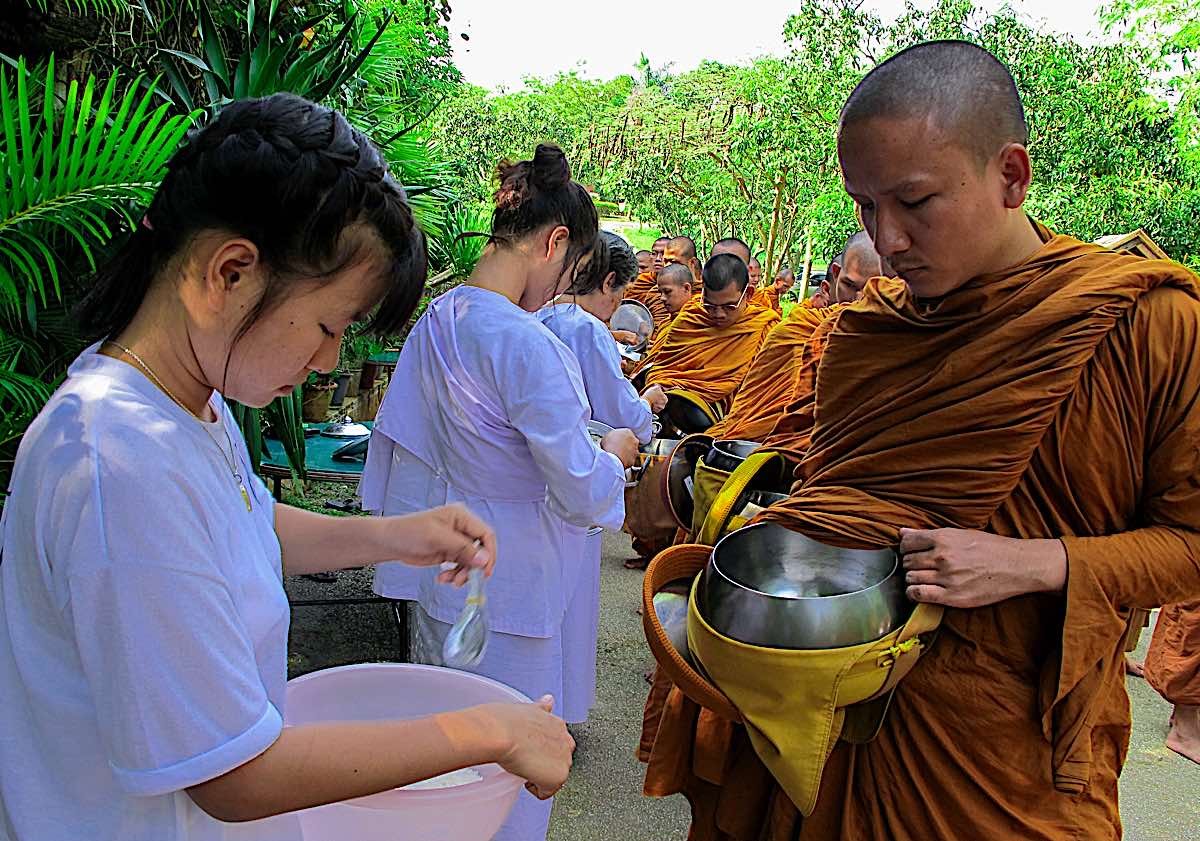
Offerings “obtained righteously, and offered “with a pleasant mind” — Dakkhinaavibhangasuttam Sutta of Offerings
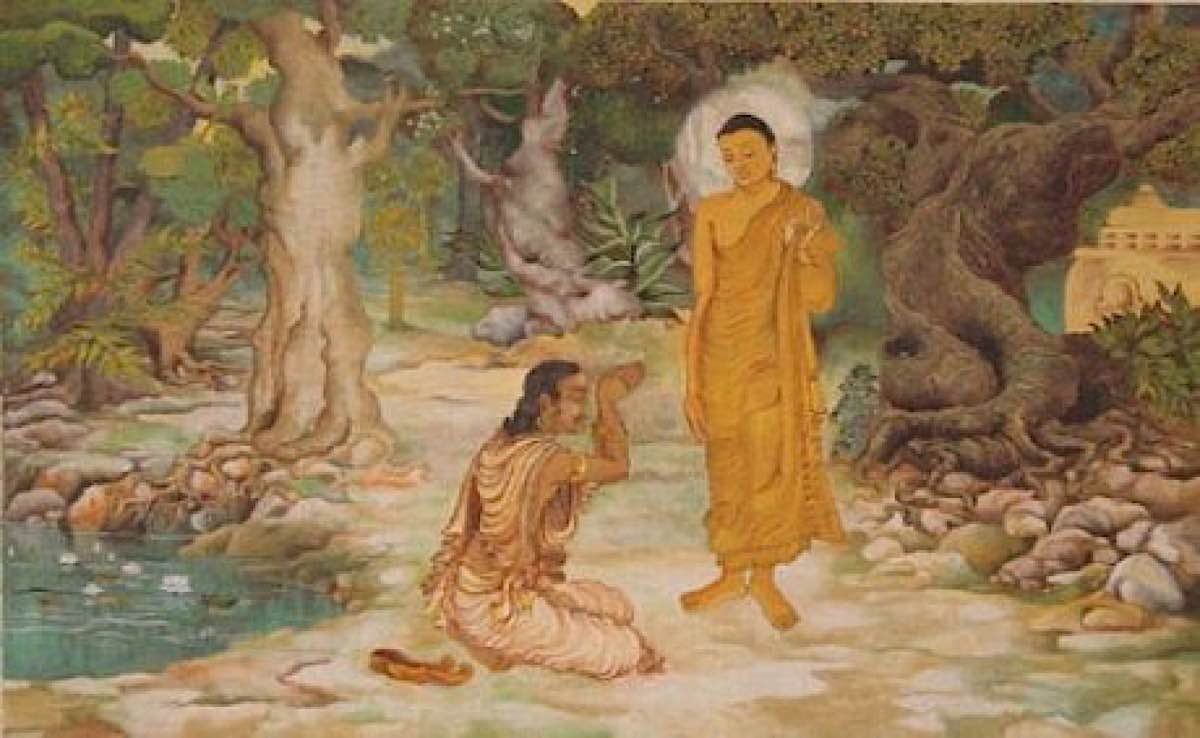 Anathapindika bows before the Buddha. He is famous as the benefactor who donated the Jetavana retreat park to the Buddha and his followers. This valuable offering has great value and merit if it was attained through righteous “right conduct.”
Anathapindika bows before the Buddha. He is famous as the benefactor who donated the Jetavana retreat park to the Buddha and his followers. This valuable offering has great value and merit if it was attained through righteous “right conduct.”
“A vast shower of merit will pour down on a giver.”
–Samyutta Nikaya I.101
Offerings to those in need, and especially offerings to the Buddha, Dharma and Sangha always have skies of merit. If it is within our means, ethically, we have obligation to give, to help and especially to support the Sangha and Dharma. [For the FULL SUTTA on Giving, see below.]
However, a simple water offering, or a donation of food given by a hard-working person has more merit than a treasure given by a person who attained the wealth improperly. If the donor obtains the offering righteously and gives with a pleasant mind, this has vast merit and unbelievable positive karma. If a student offers service to a Dharma teacher or serves the Sangha, or volunteers to work on the Dharma website, this is likewise a vast “sky of merit.”
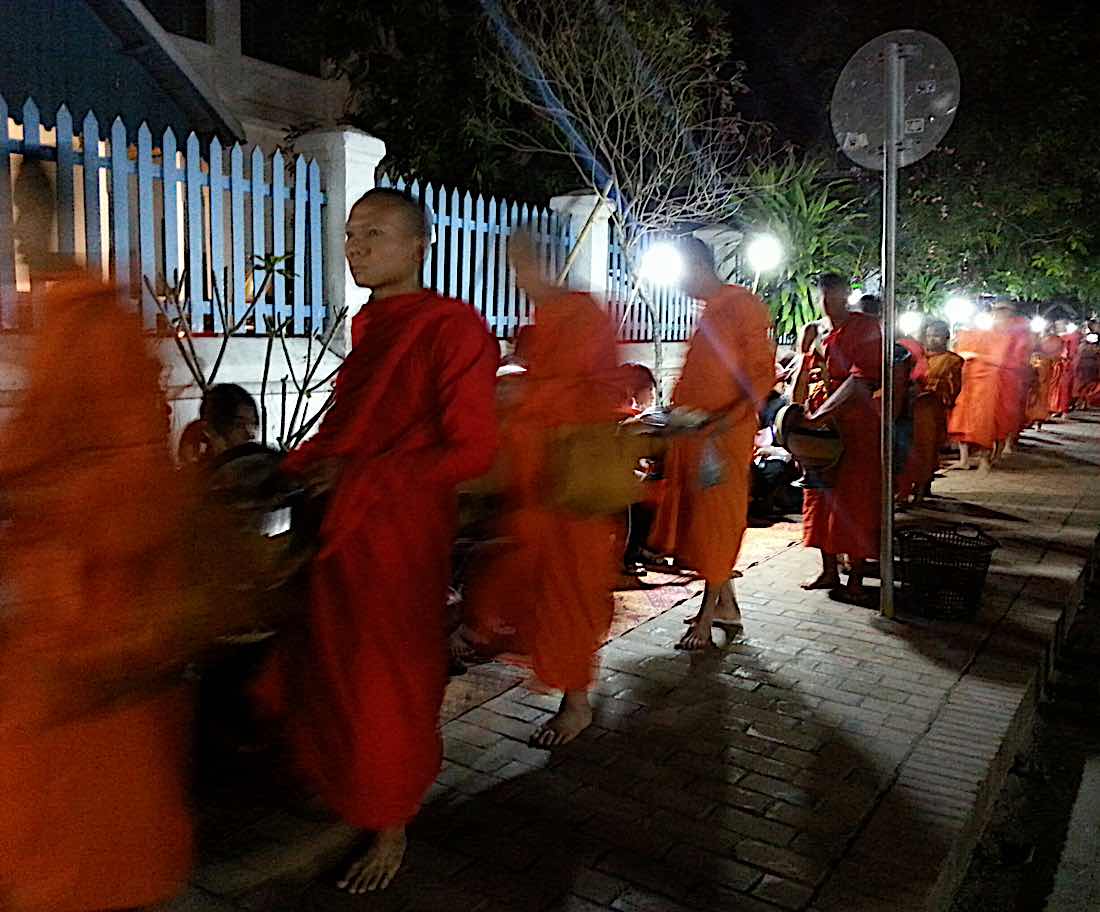 Alms for the Sangha is a treasured practice that has “skies of merit.”
Alms for the Sangha is a treasured practice that has “skies of merit.”
It isn’t the amount or scale that matters. A grain of rice offered by a person of virtue with a pleasant mind has more value than pounds of gold bullion offered from a non-virtuous donor.
More Quotes on Generosity from Pali Sutta
“The gift of Dharma surpasses all gifts.”
Dhammapada 354
“Some provide from the little they have,
Others who are affluent don’t like to give.
An offering given from what little one has
Is worth a thousand times its value.”
Samyutta Nikaya I.18
“Monks, if people knew, as I know, the fruits of
sharing gifts, they would not enjoy their use without
sharing them, nor would the taint of stinginess obsess the
heart. Even if it were their last bit, their last morsel of
food, they would not enjoy its use without sharing it if
there was someone else to share it with.”
Itivuttaka 18
“If you have little, give a little; if you have a
middling amount, give a middling amount; if you have much,
give much. It is not fitting not to give at all.”
Jataka V.382
In other words, giving to those in need matters, but how we obtain the offerings matters nearly as much, according to the teachings of the Buddha, especially, as stated in the Dakkhinaavibhangasuttam, the Sutta of the Classification of Offerings.
With a Pleasant Mind
Virtuous offerings to the Buddha, Dharma and Sangha — the Three Jewels — are always meritorious — but how those offerings were obtained matters more than their tangible value. Offering with a “pleasant mind” said the Buddha is the most meritorious. Buddha said,
A virtuous donor offers to one without virtues, things obtained righteously, with a pleasant mind.
To give with a “pleasant mind” means to have no doubts as to its virtue — it was obtained without harming any other being. For example, giving food to the monastic Sangha can be considered the highest of offerings, if the food was obtained without harm to another.
The intention is of more value than the tangible worth of the goods. [The full Dakkhinaavibhangasuttam translated to English is below.]
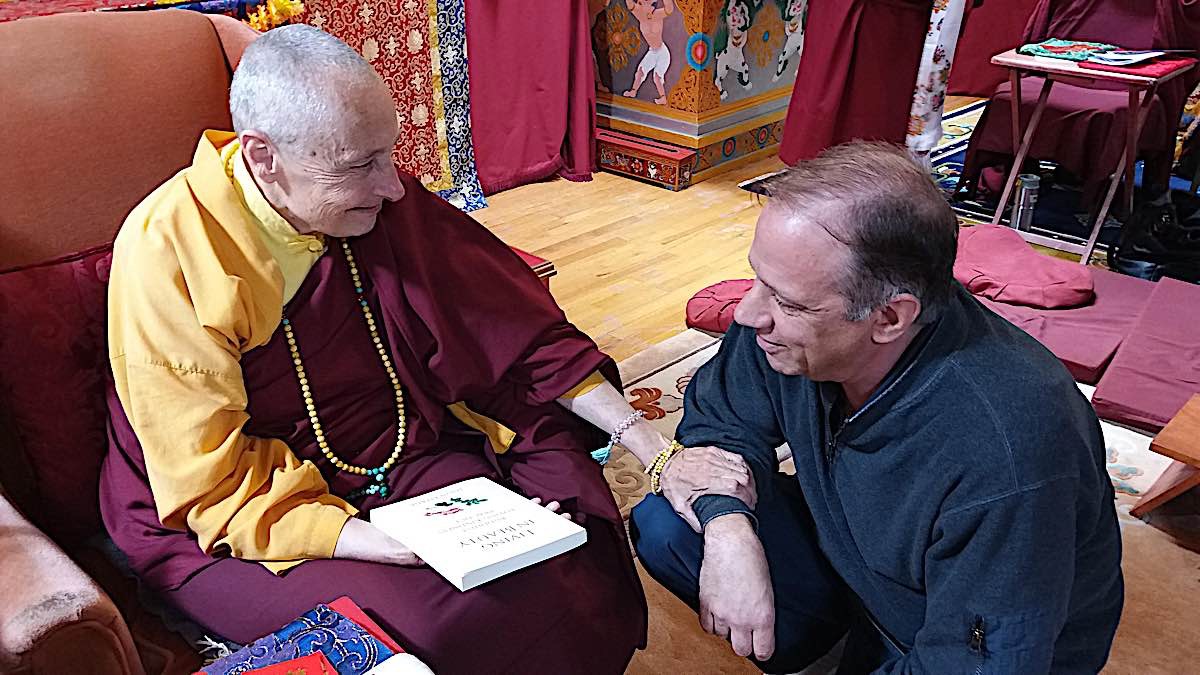 Jason Espada (right) with his teacher Ani Tenzin Palmo. Like Jason, we can strive to serve our teachers, the Dharma, and the broader Sangha community with a virtuous mind.
Jason Espada (right) with his teacher Ani Tenzin Palmo. Like Jason, we can strive to serve our teachers, the Dharma, and the broader Sangha community with a virtuous mind.Donating your time to Dharma activities is very valuable
This is why many teachers value your time above your offerings. If you donate your time generously, without conditions, for the benefit of the Dharma and the Sangha, there can be no doubt of “pleasant mind” and virtue. If you, on the other hand, have no time, and donate “money” — the money still must come from a pleasant mind. It must have been earned wholesomely, through your own hard work, without any malice, negativity or harm to other beings.
 A simple offering of incense and prayer is among the most virtuous of offerings.
A simple offering of incense and prayer is among the most virtuous of offerings.In other words, if you stole the money for the offering, or earned the commission through a “lying sales pitch” or caused the death or suffering of any being — that money is not donated with a “pleasant mind” or virtue. While putting it to good use, for Dharma causes, may help mitigate the negativity of non-virtuous activities, it is not any where near as valuable as a bowl of water offered by a person with virtuous mind.
In The Sutta of the Classification of Offerings [in full below] Buddha teaches how to classify offerings, and the importance of intention, mind and positive virtue in all offerings.
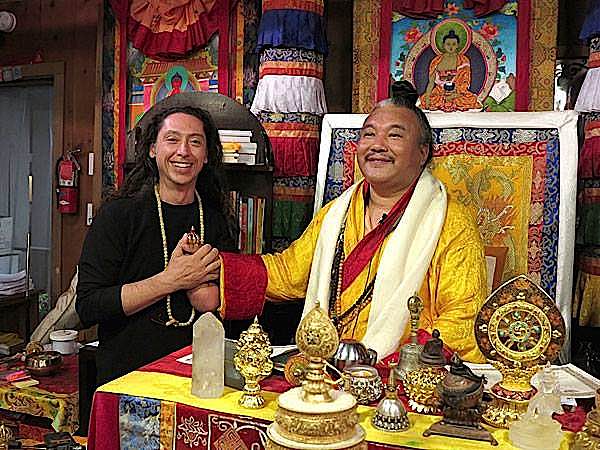 AlejAndro Anastasio and his Guru Dzogchen Khenpo Choga Rinpoche. Being of service to the Guru is the highest offering.
AlejAndro Anastasio and his Guru Dzogchen Khenpo Choga Rinpoche. Being of service to the Guru is the highest offering.Water bowl offerings — always a “pleasant mind”
In some Buddhist traditions — such as Tibetan Buddhism — the water bowl offering is considered among the highest of offerings, more precious than a mountain of jewels. The mountain of jewels offering (in the form of a mandala offering, for example) is more often visualized to avoid issues with unethical conduct such as negative livelihood or negative speech or negative conduct.
Why? Because if you must undertake negative activities to buy the jewels for your offering — negative livelihood, or falsehoods or stealing, or simply being “greedy for the merit” — then, you can create more obstacles to your path. Water — readily available with cost in most areas not in a drought situation — is considered the purest offering for this reason.
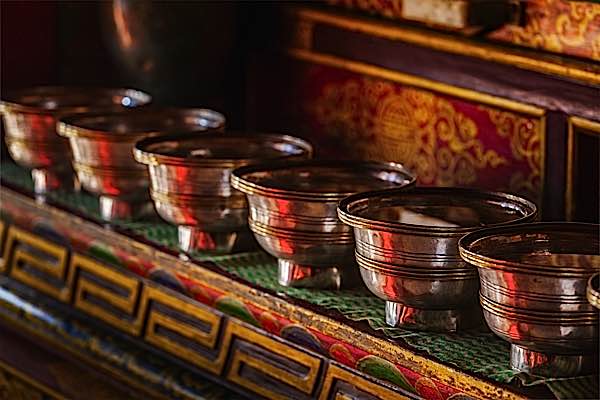 The simplest and most elegant offering is water. The eight bowls represent the eight sensory offerings, but each is filled with water. The reason we offer water in this practice is it is considered pure. It also recognizes that all people, even someone who has nothing to offer, can generate good karma with offerings. With the exception of areas with shortage of water, generally water is the least expensive offering, accessible to all.
The simplest and most elegant offering is water. The eight bowls represent the eight sensory offerings, but each is filled with water. The reason we offer water in this practice is it is considered pure. It also recognizes that all people, even someone who has nothing to offer, can generate good karma with offerings. With the exception of areas with shortage of water, generally water is the least expensive offering, accessible to all.Virtues of offerings depend on “pleasant mind”
To have a “pleasant mind” means to have no doubts as to its virtue. Nothing was killed for the offering. No non-virtuous act was undertaken for the offering. No lies were spoken to obtain the offering. No negative livelihood (stealing, killing, and so on) were required to acquire the offering.
The point of offerings is to overcome the poison of “greed.”In order to appear “generous” to the Three Jewels (make offerings) you mist with “pleasant” and honest mind, believe the offerings are properly obtained.
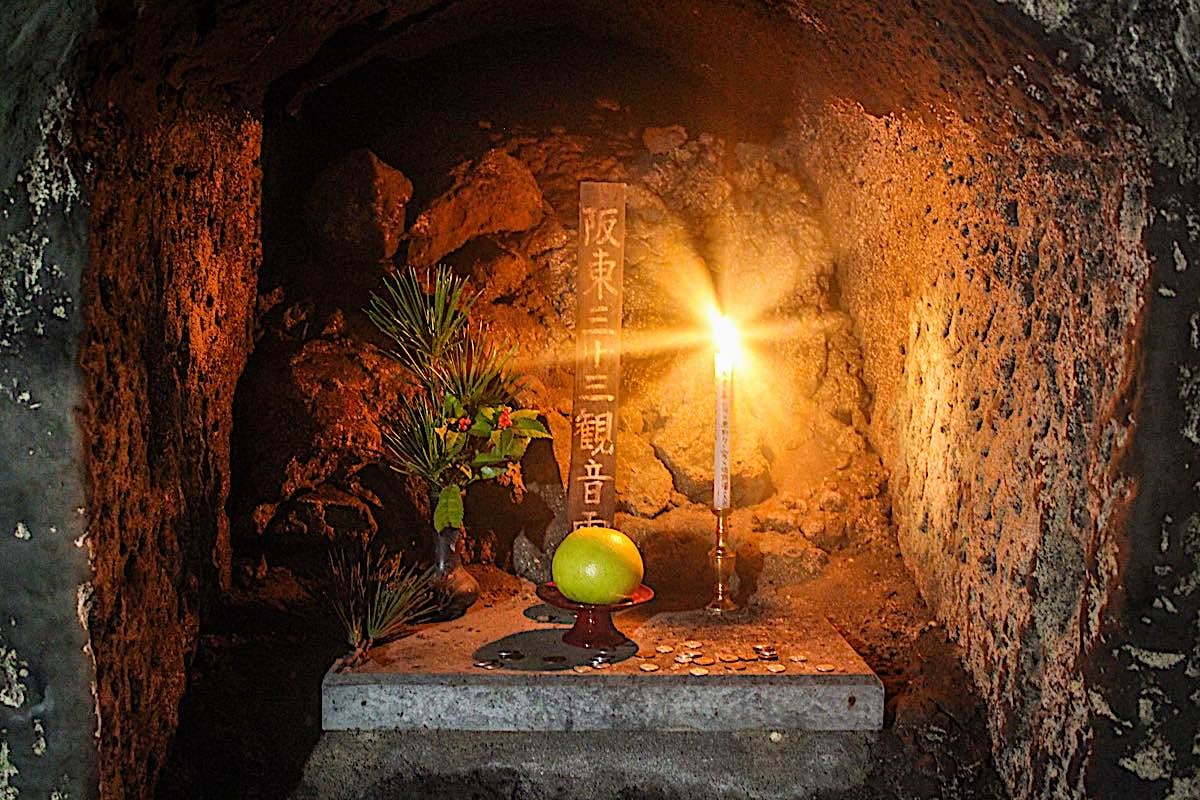 Simple offerings are often the best to avoid striving and stress. A virtuous mind is important. Here, the offering is light and one apple in a Japanese shrine at Taya Cave in Japan.
Simple offerings are often the best to avoid striving and stress. A virtuous mind is important. Here, the offering is light and one apple in a Japanese shrine at Taya Cave in Japan.
“Obtained Righteously”
Shakyamuni Buddha, in the Dakkhinaavibhangasuttam, explains why the virtue of the offering — and the person making the offering — is more important than the offering itself. Offerings “obtained righteously, with a pleasant mind” are the most valuable. He also taught, that offering to the Sangha are of virtually the same merit as offering to the Buddha. In the sutra he teaches:
‘These are the four kinds of purity …
A virtuous donor offers to one without virtues, things obtained righteously, with a pleasant mind,
Believing the results of actions. That offering is purified on the side of the donor.
A not virtuous donor offers to the virtuous, things not obtained righteously, with an unpleasant mind,
Disbelieving the results of actions. That offering is purified on the side of the receiver
A not virtuous donor offers to the not virtuous, things not obtained righteously, with an unpleasant mind,
Disbelieving the results of actions. That offering is not purified on either side.
A virtuous donor offers to the virtuous, things obtained righteously, with a pleasant mind,
Believing the results of actions. I say, that offering brings great results
One not greedy offers to those not greedy, things obtained righteously, with a pleasant mind,
Believing the results of actions. I say, that is the highest material offering.”
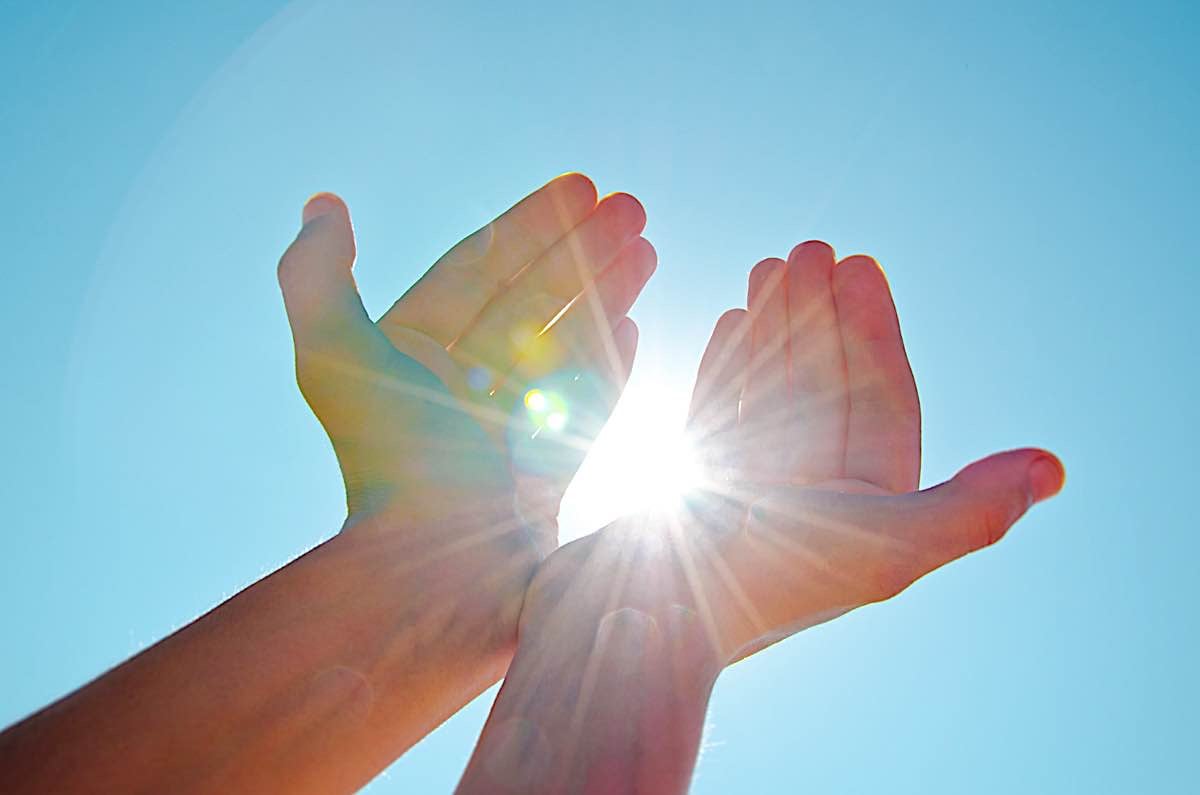 Here, a symbolic offering of the sun. Having tangible offerings is not important. Having a virtuous mind and intention is valuable.
Here, a symbolic offering of the sun. Having tangible offerings is not important. Having a virtuous mind and intention is valuable.
Dakkhinaavibhangasuttam
Sutta of the Classification of Offerings
I heard thus:
At one time the Blessed One lived with the Sakyas in Nigrodha’s monastery in Kapilavatthu. Then Mahapajaapati Gotamii taking a set of new clothes approached the Blessed One, worshipped, sat on a side and said. ‘Venerable sir to make this set of clothes for the Blessed One I spun and wove the cloth. May the Blessed One accept this set of clothes from me, out of compassion.’ The Blessed One said. ’Gotamii, offer it to the Community. When offered to the Community, it will be offered to me as well.’ For the second time Mahapajaapati Gotamii said ‘Venerable sir to make this set of clothes for the Blessed One, I spun and wove the cloth. May the Blessed One accept this set of clothes from me, out of compassion.’ For the second time the Blessed One said. ’Gotamii, offer it to the Community. When offered to the Community, it will be offered to me as well.’ For the third time Mahapajaapati Gotamii said ‘Venerable sir to make this set of clothes for the Blessed One I spun and wove the cloth. May the Blessed One accept this set of clothes from me, out of compassion.’ For the third time the Blessed One said. ’Gotamii, offer it to the Community. When offered to the Community, it will be offered to me as well.’
Hearing this venerable Ánanda said to the Blessed One. ‘Venerable sir, accept the set of new clothes from Mahapajaapatii Gotami. She was of much help to you, as stepmother, supporter, the one who fed milk, when the Blessed One’s mother died. The Blessed One too was of great help to Mahapajaapati Gotamii Come to the Blessed One she took refuge in the Enlightenment, in the Teaching and the Community. Come to the Blessed One. She abstained from, taking the life of living things, taking what is not given, misbehaving sexually, telling lies and taking intoxicating drinks. Come to the Blessed One Mahapajaapati Gotami got established in unwavering faith in Enlightenment, in the Teaching and the Community. Come to the Blessed One Mahajaapati Gotamii dispelled doubts about the truth of unpleasantness, its arising, its cessation, and the path and method leading to its cessation. Thus the Blessed One was of great help to Mahapajaapati Gotami’
‘That is so. Ánanda, if a person came to another person, took refuge in the Enlightenment, the Teaching and the Community. I say the gratitude he has to return to that second person, is not repaid by joining hands in veneration, getting up and offering a seat on arrival, exchanging pleasant conversation and offering robes, morsel food, dwellings and requisites when ill. Ánanda, if a person come to another person, abstained, from taking the life of living things, taking what is not given, misbehaving sexually, telling lies and taking intoxicating drinks.
I say the gratitude he has to return to that second person, is not repaid by joining hands in veneration, getting up and offering a seat on arrival, exchanging pleasant conversation and offering robes, morsel food, dwellings and requisites when ill. Ánanda, if a person came to another person, is established in unwavering faith in the Enlightenment, the Teaching and the Community. I say the gratitude he has to return to that second person, is not repaid by joining hands in veneration, getting up and offering a seat on arrival, exchanging pleasant conversation and offering robes, morsel food, dwellings and requisites when ill. Ánanda, if a person meeting another person, became virtuous. I say the gratitude he has to return to that second person, is not repaid by joining hands in veneration, getting up and offering a seat on arrival, exchanging pleasant conversation and offering robes, morsel food, dwellings and requisites when ill. Ánanda, if a person, met another person and dispelled his doubts about the Enlightenment, the Teaching and the Community. I say the gratitude he has to return to that second person, is not repaid by joining hands in veneration, getting up and offering a seat on arrival, exchanging pleasant conversation and offering robes, morsel food, dwellings and requisites when ill.
Ánanda, there are fourteen personal offerings that could be made. An offering made to the Thus Gone One, worthy and rightfully enlightened is the first personal offering. An offering made to the silent Enlightened One, is the second personal offering. An offering made to a worthy disciple, [1] is the third personal offering. An offering made to a person fallen to the method of realizing worthiness, [2] is the fourth personal offering. An offering made to a non-returner, [3] is the fifth personal offering. An offering made to a person fallen to the method of realizing the state of non- returning is the sixth personal offering. An offering made to one, returning once, [4] is the seventh personal offering. An offering made to a person fallen to the method of realizing the state of returning once is the eighth personal offering. An offering made to one who has entered the stream of the Teaching is the ninth personal offering. An offering made to a person fallen to the method of realizing the state of entry into the stream of the Teaching is the tenth personal offering. An offering made to one, not greedy and turned away from sensuality is the eleventh personal offering. An offering made to an ordinary virtuous person is the twelfth personal offering. An offering made to an ordinary not virtuous person is the thirteenth personal offering. An offering made to an animal is the fourteenth personal offering. .
Ánanda, of an offering made to an animal the results expected are by hundreds. Of an offering made to an ordinary not virtuous person the results expected are by thousands. Of an offering made to an ordinary virtuous person the results expected are by hundred -thousands Of an offering made to a not greedy one, turned away from sensuality the results expected are by hundred thousand millions. Of an offering made to a person fallen to the method of realizing the state of entry into the stream of the Teaching, the results expected are innumerable and unlimited. What would be the results for offering a gift to a stream entrant of the Teaching? Or one fallen to the method of realizing the state of not returning? Or one who would not return? Or one fallen to the method of realizing worthiness? Or a worthy disciple of the Thus Gone One? Or the silent enlightened One? Or the worthy, rightfully enlightened Thus Gone One?
Ánanda, these seven are the offerings made to the Community. An offering to both Bhikkhus and Bhikkhunis headed by the Blessed One. This is the first offering made to the Community. After the demise of the Blessed One, an offering made to both Bhikkhus and Bhikkhunis. This is the second offering made to the Community. An offering made to the Bhikkhus. This is the third offering to the Community. An offering made to the Bhikkhunis. This is the fourth offering to the Community. An offering made indicating the number of Bhikkhus and Bhikkhunis. This is the fifth offering to the Community. An offering made indicating the number of Bhikkhus. This is the sixth offering to the Community. An offering made indicating the number of Bhikkhunis. This is the seventh offering to the Community.
Ánanda, in the future there will be the last Bhikkhus in the lineage, not virtuous with evil things, wearing yellow strings round their necks. I say, even the results of an offering made to them on account of the Community is innumerable and limitless. I would not tell you, how an offering made to the Community is more fruitful than a personal offering.
Ánanda, there are four kinds of purity in an offering. An offering is pure, on the side of the donor, not the receiver. An offering is pure, on the side of the receiver, not the donor. An offering is neither pure on the side of the donor, nor the receiver. An offering is pure, on the side of the donor, as well as the receiver.
Ánanda, how is the offering pure, on the side of the donor and not the receiver? Here the donor is virtuous with good thoughts, the receiver is not virtuous with evil thoughts. Thus the offering is pure, on the side of the donor and not the receiver.
Ánanda, how is the offering pure, on the side of the receiver and not the donor? Here the receiver is virtuous with good thoughts, the donor is not virtuous with evil thoughts. Thus the offering is pure, on the side of the receiver and not the donor.
Ánanda, how is the offering neither pure on the side of the donor nor the receiver? Here the donor is not virtuous with evil thoughts and the receiver is not virtuous with evil thoughts. Thus the offering is neither pure, on the side of the donor nor the receiver
Ánanda, how is the offering pure on the side of the donor as well as the receiver? Here the donor is virtuous with good thoughts and the receiver is virtuous with good thoughts. Thus the offering is pure, on the side of the donor as well as the receiver.’
The Blessed One said.

 JaneWalter
JaneWalter 











